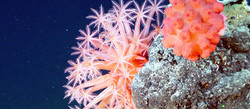
deep-sea fisheries project to reduce impacts on marine habitats
Editor/Mohamed Shihab
GEF-funded partnership continues to address challenges and strengthen cooperation on deep-sea fisheries and biodiversity conservation in shared marine waters.
The Common Oceans Deep-sea fisheries project launches new phase to continue the quest for sustainable use and protection of deep-sea marine life in the ocean areas beyond national jurisdiction (ABNJ). Over the next five years, the goal is to further improve deep-sea fisheries management and reducing their impact on the environment and biodiversity.
“Deep-sea fisheries are a valuable and important source of employment, livelihoods and nutrition, yet overfishing and resulting depletion of deep-sea fish stocks pose major challenges”, says Viktoria Varga Lencses, Common Oceans Program Coordinator. “Building on the progress made in the first phase, the project will play a key role in addressing these threats, resulting in healthy deep-sea marine life in line with the Sustainable Development Goals”.
By supporting science-based fisheries management with improved catch monitoring and reporting, the ambition is that an additional 25 percent of deep-sea fish stocks, about 50 000 tonnes of catch, will come from sustainably managed stocks by 2027.
Eszter Hidas, coordinator of the Common Oceans Deep-sea fisheries project, explains that focus is on data-poor stocks, deep-water sharks and protection of vulnerable marine ecosystems (VMEs). “Our ambition is to continue to reduce the environmental impacts caused by harmful fishing practices by continuing to improve measures to protect VMEs in 42 million hectares that are currently closed to bottom fishing”, she adds.
From 2014-2019, efforts were made to protect VMEs from negative fishing impacts by mobilizing and empowering deep-sea regional fisheries management organizations (RFMOs) to conduct bottom fishing impact assessments in designated areas. As a result, 18 new VME sites were established to safeguard deep-sea species such as corals and sponges from negative fishing impacts.
Another commitment is to promote the adoption of and compliance with international fisheries obligations to improve management of deep-sea fish stocks, and reduce negative impacts on bycatch species in over 3 billion hectares of marine habitats – about three times the size of Europe.
Miguel Bernal, Executive Secretary of the General Fisheries Commission for the Mediterranean (GFCM), states that GFCM is pleased to be in charge of the execution of the next phase. “This unique partnership is capable of catalysing important transformational changes needed to reduce exploitation and improve conservation of stocks and deep-sea ecosystems across the ABNJ”.
A partnership for sustainability and biodiversity
The Deep-sea fisheries project is part of the Common Oceans Program funded by the Global Environment Facility (GEF) that has galvanised international action in support of sustainable management and biodiversity conservation of the ABNJ.
With a USD 50 million grant by the GEF, the Program made tuna and deep-sea fishing more sustainable from 2014-2019. Significant strides were made in tackling IUU-fishing by developing new tools to improve monitoring of fishing activities, protecting marine life by reducing bycatch and marine pollution through the use of new fishing gear and techniques, and in safeguarding vulnerable marine ecosystems from negative fishing impacts.
In 2020, the GEF allocated an additional USD 27 million for the Common Oceans Program to ramp up its efforts. Nearly USD 4.5 million was dedicated to the Deep-sea Fisheries project. This figure was complemented by over USD 50 million in co-financing.
About the Common Oceans Deep-sea Fisheries project
The Common Oceans Deep-sea fisheries project brings together a global partnership dedicated to advance responsible deep-sea fisheries management and biodiversity conservation in areas beyond national jurisdiction (ABNJ). Funded by the GEF and led by the United Nations Food and Agriculture Organisation (FAO), it works in collaboration with the eight deep-sea RFMOs, the private sector, national and international organizations.


ساحة النقاش